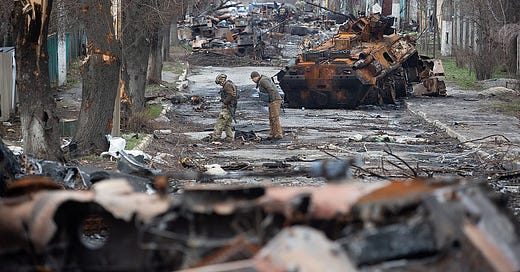The Scrum concludes Ambassador Tony Kevin’s two-part series investigating the alleged atrocities in two Ukrainian cities and official accounts of who is responsible for them. We find these pieces of especial importance given the grave and consequential malpractice of Western media pretending to report on events in Ukraine and the brazenly false statements, filled with preposterous word inflation and irresponsibly drawn conclusions, of those purporting to lead the major Western powers.
Tony Kevin’s gathered facts and analysis leave little room for doubt in these matters.
We appear to be entering, if we have not already done so, a new wave of brute censorship, the apparent objective of which is to eliminate all dissenting views—and the facts that support these views—from our public discourse. It is in the face of this onslaught, which has already affected The Scrum’s editors, that we value Tony Kevin’s contributions to the utmost. Our shared project now, in which each of us has a part, is to bear witness. Tony Kevin has done so. We are confident future historians will recognize the worth of these two essays as much as we do.
Part 1 of this series can be found here.
—P. L.
By Tony Kevin
The success of “disinformation warfare” often stems from an initial, massively coordinated presentation to world media of a simple but false story, which no amount of scientific and rational argument can later dislodge. Such a story is framed to appeal to emotional triggers that enrage and incense people before they have the chance to see if the story is true…
— David MacIlwain, Wodonga, Australia.
When do corpses begin to smell?
— Google, multiple references.
15 APRIL—It is a daunting task now, 11 days after the news on 4 April of the alleged massacre by Russian soldiers of up to 200 Ukrainian civilians in Bucha—and hundreds more by the Kiev regime’s count—to challenge the Russian atrocity narrative, so firmly is it now lodged in the minds of Western readers. It seems to have already passed beyond fact into realms of legend, of folklore. But let me try and introduce the subject this way with some general propositions.
I assert that Ukraine’s present government, centred in Kiev and Lvov, is now so extreme-nationalist in its avowed ideology and style of governance that it can fairly be described as a kind of fascist or Nazi regime. Under its governance and under the pressures of an increasingly cruel and desperate war, Ukraine is reverting to savagery. Yes, I know President Zelensky is of Jewish ethnicity—but this is politically irrelevant. The important thing is that he is the puppet and mouthpiece of a thick layer of extreme nationalists—“Ukronazis” may be the justified term—who are now strategically embedded into Ukrainian government, the armed forces, and the police at all levels, such that they are in position to drive Ukrainian policy and governance. As a result, Ukraine is rapidly descending into cruel and hateful behaviour toward Russians and toward its own people. It is ceasing to be a civilized country.
Russia’s initial assumption when it went into this war (which I freely admit I shared) was that below the Kiev government and its extreme-nationalist influences, powerful as it and they are, the mass of Ukrainian people would feel some kinship to Russians, were not at heart hostile to Russia, and would be open to accepting Russia’s fraternal assistance in the denazification of Ukraine. Did Russia expect a short and easy war ending in joyful joint flag parades in Kiev, in Kharkov, in Odessa? It seems they did. They, and I, were wrong.
Peeling another layer off this onion, has the fatal Russian flaw in this war been its perhaps naïve belief in the essential brotherhood of Russians and Ukrainians? Had Moscow not realized how deeply the virus of Russia-hatred has, after so many years of bitterly anti–Russian Western propaganda and the extreme-nationalist propaganda evident in Ukraine, the latter well-funded and well advised by Anglo–American professionals in these dark arts—had this contaminated the minds of more and more Ukrainians to an extent Russia did not anticipate?
Fascist-style regimes rely on two things: wall-to-wall propaganda narratives and citizens’ well-founded fear of instant death. History is quite clear on this point. In Ukraine this syndrome began its current, critical phase a few weeks ago, with sadistic public floggings in the streets of naked minors of all ages and both sexes and alleged to be criminals, these images salaciously spread around social media. Now it has quickly degenerated to the stage of real acts of torture and murder of captured Russian prisoners of war—these filmed and displayed on social media.
And also now, we see repeated Ukrainian government disinformation narratives involving real, officially supported mass murders of Ukrainian civilians, murders immediately blamed on Russia in clumsy, lethally false scenarios that are now nevertheless accepted unquestioningly in the West. In recent days we have seen this weapon deployed in towns around Kiev, in Mariupol, and in Kramatorsk. In every case, the narratives are false and easily proven so.
Keep reading with a 7-day free trial
Subscribe to The Floutist to keep reading this post and get 7 days of free access to the full post archives.



